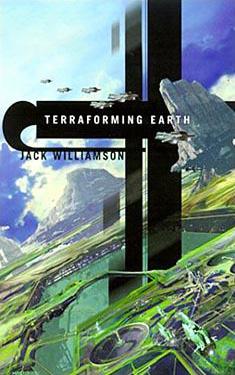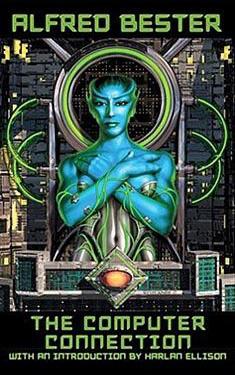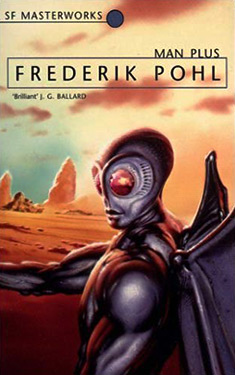Review: Audrey’s Door by Sarah Langan
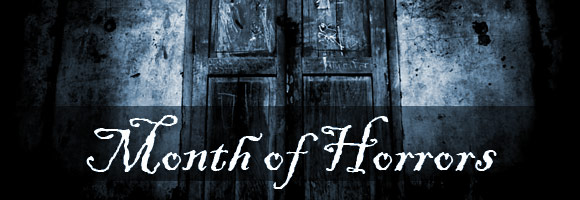
Guest Blogger, Allie McCarn, reviews science fiction and fantasy books on her blog Tethyan Books. She has contributed many great book reviews to WWEnd and has generously volunteered to write some periodic reviews for our blog.
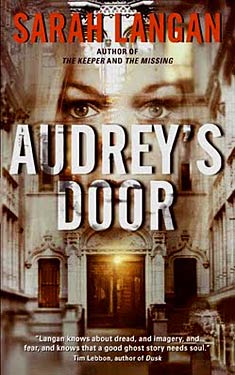 Audrey’s Door by Sarah Langan
Audrey’s Door by Sarah Langan
Published: Harper & Row, 2009
Awards Won: 2009 Stoker Award
The Book:
“Built on the Upper West Side, the elegant Breviary claims a regal history. But despite 14B’s astonishingly low rental price, the recent tragedy within its walls has frightened away all potential tenants . . . except for Audrey Lucas.
No stranger to tragedy at thirty-two-a survivor of a fatherless childhood and a mother’s hopeless dementia, Audrey is obsessively determined to make her own way in a city that often strangles the weak. But is it something otherworldly or Audrey’s own increasing instability that’s to blame for the dark visions that haunt her . . . and for the voice that demands that she build a door? A door it would be true madness to open . . .” ~WWEnd.com
It’s October again, and that means I’m branching out, once again, to horror! Audrey’s Door is the October reading selection for Calico Reaction’s Theme Park book club, so it seemed like a good choice for a Halloween-themed review.
GMRC Review: Terraforming Earth by Jack Williamson
 Guest Blogger, Allie McCarn, reviews science fiction and fantasy books on her blog Tethyan Books. She has contributed many great book reviews to WWEnd and has generously volunteered to write some periodic reviews for our blog.
Guest Blogger, Allie McCarn, reviews science fiction and fantasy books on her blog Tethyan Books. She has contributed many great book reviews to WWEnd and has generously volunteered to write some periodic reviews for our blog.
Terraforming Earth by Jack Williamson
Published: Tor, 2001
Awards Won: 2002 John W. Campbell Memorial Award
The Book:
“There is a chance, however remote, that an asteroid might collide catastrophically with the Earth and destroy humanity. With that in mind, Calvin DeFort planned a moon base to preserve the genetic material of Earth against future disasters. He couldn’t know how soon that base would be needed.
The base is unfinished when the collision occurs, and few make it off of the Earth in those last hours. Those eight survivors are fated to spend the rest of their life in the moon base, within sight of their dead home planet. Thousands of years and many cloned generations of the original survivors will pass before the Earth is once again habitable. Raised by robots, and indoctrinated into the roles of their forebears, each new clone generation carries the responsibility of the future of the human race.” ~Allie
This is my 10th novel for WWEnd’s Grand Master Reading Challenge. Jack Williamson was the second author awarded the Grand Master title (after Heinlein), but this is the first of his work that I’ve ever read. He wrote many novels and short stories in his long career, which spanned from 1928 to just before his death in 2006. Serialized in “Analog” and “Science Fiction Age”, and published in 2001, Terraforming Earth is one of his later works.
GMRC Review: The Computer Connection by Alfred Bester
 Guest Blogger, Allie McCarn, reviews science fiction and fantasy books on her blog Tethyan Books. She has contributed many great book reviews to WWEnd and has generously volunteered to write some periodic reviews for our blog.
Guest Blogger, Allie McCarn, reviews science fiction and fantasy books on her blog Tethyan Books. She has contributed many great book reviews to WWEnd and has generously volunteered to write some periodic reviews for our blog.
The Computer Connection by Alfred Bester
Published: Berkley/Putnam, 1975
Awards Nominated: Hugo, Nebula, and Locus SF Awards
The Book:
”There is a Group of eccentric immortals, who have all come into being after a shocking near-death experience. Some of them are actual historical celebrities, but others simply take on names that best describe their interests. Guig’s name comes from the “Grand Guignol”, and he earned it through his obsession with recruiting new immortals. Unfortunately, it’s difficult to orchestrate an experience of horrific near-death followed by a miraculous save, so all his attempts have ended in failure. Mostly, he just kills people in terrible ways—but with the best of intentions.
Guig has his sights set on a new recruit, a genius Cherokee scientist named Sequoya Guess. The conversion marks Guig’s first success, but then something unexpected happens. Guess has mysteriously formed a connection with a supercomputer known as the Extro. Guess may want to further his research and make life better for humankind, but the Extro has more homicidal intentions. Guig and his Group must face the terrible truth—if Guess can’t control the Extro, they may have to kill a man they think of as a brother.” ~Allie
This is my September novel for the Grand Master Reading Challenge. I picked this novel because I am generally a fan of Alfred Bester. He is a skilled wordsmith, and everything he writes seems to be brimming with energy and enthusiasm. While The Computer Connection was as ridiculous and energetic as usual, I don’t think it is one of his best novels. For any newcomers to Bester’s work, I would recommend starting with some of his more well-known novels, such as The Demolished Man or The Stars My Destination.
Review: The Sparrow by Mary Doria Russell
This review originally appeared on my blog Tethyan Books.
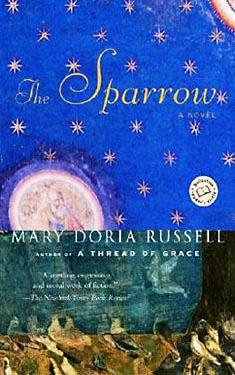 The Sparrow by Mary Doria Russell
The Sparrow by Mary Doria Russell
Published: Black Swan, 1996
Series: There is a sequel, Children of God
Awards Won: 1997 BSFA, 1998 Clarke
Awards Nominated: 1997 Campbell
One kind-of spoiler follows, which is revealed at the beginning of the first chapter.
The Book:
“When the first alien society was discovered, it was not the government of any country that sent the first expedition. Instead, the first to react was the Society of Jesus, a religious order with a long history in the exploration and study of newly discovered foreign lands. The Jesuits quickly and privately mobilized a group of eight friends and experts to make the dangerous journey to a new world.
They went not to proselytize, but to learn and to meet God’s other children. They went with the best of intentions. When the next public expedition finally arrived, they found only one of the original expedition still alive.
Emilio Sandoz—severely injured in body, mind, and soul—was unable to give any explanation for the squalor in which he was found. How could such an well-meaning expedition have gone so horribly wrong?” ~Allie (with some phrases taken from the prologue)
GMRC Review: Man Plus by Frederik Pohl
 Guest Blogger, Allie McCarn, reviews science fiction and fantasy books on her blog Tethyan Books. She has contributed many great book reviews to WWEnd and has generously volunteered to write some periodic reviews for our blog.
Guest Blogger, Allie McCarn, reviews science fiction and fantasy books on her blog Tethyan Books. She has contributed many great book reviews to WWEnd and has generously volunteered to write some periodic reviews for our blog.
Editor’s note: This review was submitted in July but there was a mix-up and we missed posting it in the blog for the GMRC.
Man Plus by Frederik Pohl
Published : Random House, 1976
Awards Won : 1976 Nebula Award
Awards Nominated: Hugo, John W. Campbell, and Locus SF Awards
The Book:
“In the not-too-distant future, a desperate war for natural resources threatens to bring civilization to a crashing halt. Nuclear warships from around the globe begin positioning themselves as the American government works feverishly to complete a massive project to colonize Mars.
Former astronaut Roger Torraway has agreed to be transformed by the latest advances in biological and cybernetic science into something new, a being that can survive the rigors of Mars before it is terraformed. Becoming Man Plus will allow him to be the linchpin in opening the new Martian frontier…but not without challenging his humanity as no man has ever been challenged before.” ~barnesandnoble.com
Man Plus is my July book for WWEnd’s Grand MasterReading Challenge. Frederik Pohl is not a completely new author to me, as I have read and loved his novel Gateway. Man Plus has some interesting ideas, but it did not replace Gateway as my favorite Pohl novel to date.
GMRC Review: Suldrun’s Garden by Jack Vance
 Guest Blogger, Allie McCarn, reviews science fiction and fantasy books on her blog Tethyan Books. She has contributed many great book reviews to WWEnd and has generously volunteered to write some periodic reviews for our blog.
Guest Blogger, Allie McCarn, reviews science fiction and fantasy books on her blog Tethyan Books. She has contributed many great book reviews to WWEnd and has generously volunteered to write some periodic reviews for our blog.
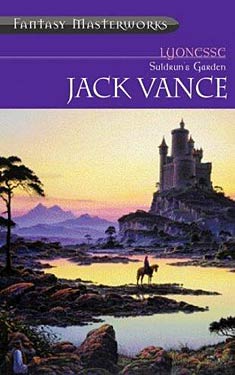 Lyonesse: Suldrun’s Garden by Jack Vance
Lyonesse: Suldrun’s Garden by Jack Vance
Published: Berkeley Publishing Group, 1983
Series: Book 1 of the Lyonesse Trilogy
Awards Nominated: Nebula Award, Locus Fantasy Award, and World Fantasy Award
The Book:
“The Elder Isles, located in the modern-day Bay of Biscay, contain a number of independent, often contentious, kingdoms. Some of kingdom’s monarchs have an eye towards unifying the entire region under a single rule. One of these ambitious rulers is King Casmir of Lyonesse, who is determined to use anyone and anything he can to conquer the other islands. For the most part, his ambition gains him only powerful enemies and war.
It is Casmir’s pretty, powerless, neglected daughter Suldrun, however, whose sad life sets a wide-reaching tale in motion Though most of the excitement and magic is experienced by others, the start of it all can be traced back to Suldrun’s peaceful, isolated garden. In these kingdoms full of violence, war, magic, ogres and fairies, there are plenty of adventures—good and bad—to be had by young princes, cruel rulers, and powerful sorcerers.” ~Allie
GMRC Review: Double Star by Robert A. Heinlein
 Guest Blogger, Allie McCarn, reviews science fiction and fantasy books on her blog Tethyan Books. She has contributed many great book reviews to WWEnd and has generously volunteered to write some periodic reviews for our blog.
Guest Blogger, Allie McCarn, reviews science fiction and fantasy books on her blog Tethyan Books. She has contributed many great book reviews to WWEnd and has generously volunteered to write some periodic reviews for our blog.
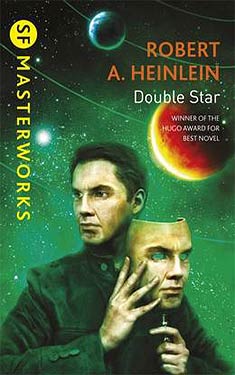 Double Star by Robert A. Heinlein
Double Star by Robert A. Heinlein
Published: Astounding Science Fiction (Analog), 1956
Awards Won: Hugo Award, 1956
The Book:
“One minute, down and out actor Lorenzo Smythe was – as usual – in a bar, drinking away his troubles as he watched his career go down the tubes. Then a space pilot bought him a drink, and the next thing Smythe knew, he was shanghaied to Mars.
Suddenly he found himself agreeing to the most difficult role of his career: impersonating an important politician who had been kidnapped. Peace with the Martians was at stake – failure to pull off the act could result in interplanetary war. And Smythe’s own life was on the line – for if he wasn’t assassinated, there was always the possibility that he might be trapped in his new role forever!” ~WWend.com
I’ve read a fair amount of Heinlein (The Moon is a Harsh Mistress, Starship Troopers, Stranger in a Strange Land, and various short stories), and I enjoyed Double Star. It seemed much lighter and action-focused than other Heinlein novels I’ve read so far.
My Thoughts:
Double Star is a pretty short, fast-paced novel, with a kind of light, not-too-terribly-serious tone that made it a lot of fun to read. I don’t think that Double Star is really comedic sci-fi, but it just has an enthusiastic, good-natured attitude that really makes it easy to get caught up in the story. The novel focuses on the actor Lorenzo Smythe, the highly skilled—and incredibly conceited—man who gets caught up in the great impersonation. At first, I thought I would find his narration irritating, since he spends an awful lot of time thinking very highly of himself, or alluding to great works of theatre. However, his whole character seems to be treated with a certain amount of humor. Rather than making me roll my eyes, his pomposity seemed to invite laughter. I also really enjoyed the way his character develops throughout the story.
GMRC Review: Way Station by Clifford D. Simak
 Guest Blogger, Allie McCarn, reviews science fiction and fantasy books on her blog Tethyan Books. She has contributed many great book reviews to WWEnd and has generously volunteered to write some periodic reviews for our blog.
Guest Blogger, Allie McCarn, reviews science fiction and fantasy books on her blog Tethyan Books. She has contributed many great book reviews to WWEnd and has generously volunteered to write some periodic reviews for our blog.
Editor’s Note: This is a May GMRC review that we didn’t get around to posting in time.
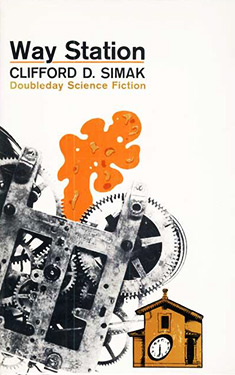 Way Station by Clifford D. Simak
Way Station by Clifford D. Simak
Published: Galaxy Science Fiction, 1963
Awards Won: 1964 Hugo Award
The Book:
"After the Civil War, the soldier Enoch Wallace returned to his family farm and rural hometown. After his parents’ death, he maintained a solitary lifestyle in that home, enduring for over a century with no apparent physical change. He lives peaceably, causing no trouble and existing only as a mild curiosity to his fellow townsfolk.
The secret of his eternal youth is technology, not magic. The truth is, Enoch has been recruited by an alien he named ‘Ulysses’ to run Earth’s first galactic way station. Unable to reveal his secrets to the world at large, he carefully records all the knowledge and wisdom he can gain from the many aliens with which he is able to converse. Now, however, people are starting to notice his unusual longevity, and it seems that he may not be able to keep the secrets of his strange life from being finally revealed." ~Allie
I first encountered Clifford D. Simak in middle school, through a tattered copy of City that I miraculously discovered a tiny classroom library. I hadn’t read any of his work since then, but WWend’s Grand Master’s Reading Challenge gave me the necessary push to finally read his Hugo winning novel!
My Thoughts:
Simak’s writing style in Way Station is very simple and clear, and it reminds me a bit of Asimov‘s style. I think the simplicity of the writing might annoy some readers, but I felt like it fit well with the tone of the novel. It is a slow-paced novel featuring a lonely near-immortal in a rural area. Despite the comings and goings of aliens, Enoch was a fairly unsophisticated man who had been leading an uncomplicated, if unusual, life. I found the character of Enoch very refreshing. He spent a lot of time carefully thinking through questions of morality and loyalty, as he slowly made peace with his own life. There were not all that many other developed characters in the novel, but it was very easy to empathize with Enoch’s thoughtful loneliness.
Most of the other characters, such as the coffee-drinking alien Ulysses, the well-meaning government agent, and the negative-stereotype-redneck Fisher family, were not deeply characterized beyond their initial impressions. The most developed secondary character, Lucy Fisher, seemed to be a little potentially problematic. Lucy is a young deaf girl that cannot speak, who is portrayed as having a kind of spiritual and magical purity and goodness born of her detachment from the modern world. Besides being a bit unlikely, Lucy’s portrayal did not bother me too much, but I imagine that it could be insurmountably irritating to people who have more personal experience with hearing disabilities.
Simak’s aliens and technology have a much more mystic and magical cast than most science fiction I’ve read. For instance, instead of having the aliens abolish religion, Enoch learns that all the aliens believe in a spiritual force. Many of the trinkets Enoch is gifted with, and the technology of the way station itself, are never completely explained. While some are clearly advanced technology, others appear to actually be mystical in nature. Since we see everything through Enoch’s point of view, we can only read what he is able to understand. I thought this was effective in communicating the idea of the massive wealth of knowledge of the universe, only a small fraction of which Enoch can ever truly grasp.
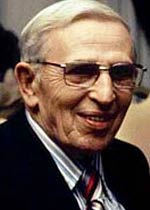 The story of Way Station moved rather slowly, and tended to go off on digressions and subplots that had only a tenuous connection to the main plot. Some of these subplots were actually quite interesting in their own right, but they did start to make the book feel a little unfocused. One in particular, concerning ‘shadow people’ that Enoch created from his own thoughts, seemed almost to be a criticism of traditional pulp characters. The conclusion of the subplot seemed to state that neither a wish-fulfillment version of oneself, nor a woman created solely to fill one’s romantic needs constitutes a believable person. Another tangential plot was the imminent threat of nuclear war, which dated the novel a bit. Many different subplots appeared to be coming together for the ending, but the conclusion ending up to be a disappointing one of the deus ex machina variety.
The story of Way Station moved rather slowly, and tended to go off on digressions and subplots that had only a tenuous connection to the main plot. Some of these subplots were actually quite interesting in their own right, but they did start to make the book feel a little unfocused. One in particular, concerning ‘shadow people’ that Enoch created from his own thoughts, seemed almost to be a criticism of traditional pulp characters. The conclusion of the subplot seemed to state that neither a wish-fulfillment version of oneself, nor a woman created solely to fill one’s romantic needs constitutes a believable person. Another tangential plot was the imminent threat of nuclear war, which dated the novel a bit. Many different subplots appeared to be coming together for the ending, but the conclusion ending up to be a disappointing one of the deus ex machina variety.
My Rating: 3.5/5
Way Station is the simply written account of a rural man, Enoch Wallace, who is tasked with running Earth’s only traveling station for aliens from all over the galaxy. It is a rather slow, contemplative novel, filled with Enoch’s thoughts and observations. I enjoyed seeing the various aliens and the alien artifacts through Enoch’s viewpoint, and I liked that the reader was almost never presented with a complete explanation for any of them. I found it interesting that Simak’s galactic empire still had room for mysticism and spirituality. One flaw of the novel was its occasional lack of cohesion, as the story sometimes wandered down side paths that were not particularly relevant to the central story. Other problems concern the frustratingly simple ending and a problematic portrayal of a young girl with a hearing disability. Way Station is a novel that shows its age, but I think it is definitely still worth reading.
GMRC Review: To Your Scattered Bodies Go by Philip José Farmer
 Guest Blogger, Allie McCarn, reviews science fiction and fantasy books on her blog Tethyan Books. She has contributed many great book reviews to WWEnd and has generously volunteered to write some periodic reviews for our blog.
Guest Blogger, Allie McCarn, reviews science fiction and fantasy books on her blog Tethyan Books. She has contributed many great book reviews to WWEnd and has generously volunteered to write some periodic reviews for our blog.
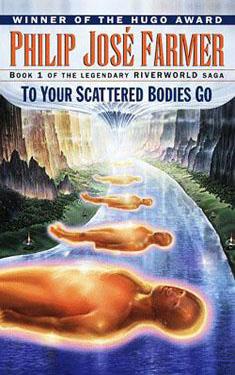 To Your Scattered Bodies Go
To Your Scattered Bodies Go
by Philip José Farmer
Published: G.P. Putnam’s Sons, 1971
Series: Riverworld Saga Book 1
Awards: 1972 Hugo Winner,
1972 Locus SF Nominated
The Book:
”Imagine that every human who ever lived, from the earliest Neanderthals to the present, is resurrected after death on the banks of an astonishing and seemingly endless river on an unknown world. They are miraculously provided with food, but with not a clue to the possible meaning of this strange afterlife. And so billions of people from history, and before, must start living again.
Some set sail on the great river questing for the meaning of their resurrection, and to find and confront their mysterious benefactors. On this long journey, we meet Sir Richard Francis Burton… and many other [people from history], most of whom embark upon searches of their own in this huge afterlife.” ~barnesandnoble.com
This is my fourth review for WWend’s Grand Master Reading Challenge. I’d never read any of Philip José Farmer’s work before, but I’d heard of the Riverworld series. I vaguely remember watching the Sci-Fi Channel adaptation in the early 2000s, but I’m pretty sure it strayed rather far from the story of the novel.
My Thoughts:
My favorite part of To Your Scattered Bodies Go was the setting and mystery of the Riverworld. It’s admittedly a very contrived environment, but that’s acknowledged in the story. Whether it is an afterlife arranged by some deity or a grand experiment arranged by some alien race, it is clear that the Riverworld was constructed with thought towards keeping the whole of humanity in comfort. The Riverworld was also presumably constructed to serve some unknown purpose for its mysterious creator(s). I enjoyed seeing the many characters’ ideas on this central mystery, and I also had fun imagining what the purpose could possibly be. In this case, I think the mystery might be much more fascinating than any actual answer that may be eventually given.
In the Riverworld, all of humanity, from all different cultures and historical periods, live together. With so many different perspectives and life philosophies, and so many real historical figures to draw on, I think this premise has a lot of potential. Unfortunately, I don’t really feel as though the novel capitalized on this potential. For one thing, the different cultures did not seem particularly distinct. For instance, a Neanderthal man seemed surprisingly similar in views and temperament to a Victorian gentleman. I feel like it could have been a much more interesting story if it had engaged with the dramatic differences in worldview between cultures that span the whole of human history.
While the story didn’t significantly feature cultural differences, it did cast a very cynical eye toward the tendency of human beings to create conflict. In a world where everyone was set on equal ground, with no pain, illness, or shortage of resources, people began almost immediately to establish hierarchies. Despite the fact that there was plenty of food, drink, and luxuries (drugs, etc.) for all, many were quick to use force to establish inequalities in wealth and power. This seemed very realistic to me. While I don’t think hierarchical thinking is THE tragic flaw in humanity, I do think that many people pursue power for power’s sake – not just to gain control of limited resources.
Despite its fascinating central mystery, and the opportunity to use the world to explore cultural differences and human nature, To Your Scattered Bodies Go seems to be mostly a boy’s adventure story. The characters were fairly flat and not very memorable beyond the brief recognition of their historical period or real-life counterpart. Each character tended to be introduced with an awkward little infodump about their previous life. There’s also a character who seems very much like an author insertion, and who constantly spouts off facts about the hero Sir Richard Francis Burton. I felt like, with so many people to choose from, a more compelling cast could have been constructed.
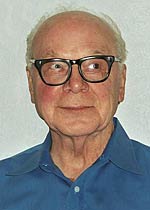 On that note, I was a little frustrated that, chosen out of all of human history, the hero and narrator was a Victorian gentleman explorer and the first villain was a Nazi, Hermann Göring. I think that, even in 1971, it must have already been a little hackneyed to use Nazis as an example of human evil and guilt. However, the situation was not quite as simple as that may make it sound, and Göring did prompt some interesting discussion of post-resurrection identity and culpability. The hero and narrator, Richard Burton, is essentially a real-life adventure hero, so I can see why he was an obvious choice for the protagonist. However, he manifested enough of the attitudes and views of the typical fictional Victorian gentleman explorer that I found him very irritating as a narrator. One of these typical attitudes is the remarkably blatant sexism that permeates the story. For a few quick examples:
On that note, I was a little frustrated that, chosen out of all of human history, the hero and narrator was a Victorian gentleman explorer and the first villain was a Nazi, Hermann Göring. I think that, even in 1971, it must have already been a little hackneyed to use Nazis as an example of human evil and guilt. However, the situation was not quite as simple as that may make it sound, and Göring did prompt some interesting discussion of post-resurrection identity and culpability. The hero and narrator, Richard Burton, is essentially a real-life adventure hero, so I can see why he was an obvious choice for the protagonist. However, he manifested enough of the attitudes and views of the typical fictional Victorian gentleman explorer that I found him very irritating as a narrator. One of these typical attitudes is the remarkably blatant sexism that permeates the story. For a few quick examples:
"She was a product of her society – like all women, she was what men had made her…”
"Even if she had been a whore, she had a right to be treated as a human being. Especially since she maintained that it was hunger that had driven her to prostitution, though he had been skeptical about that."
It seemed like Burton classified every woman he met as either a prude, a whore, or a nag, and he made it quite clear he had little interest in the women of the story outside of sex. It seemed that most of the female characters had little relevance to the story besides being sex resources for the male explorers. I know this may be a realistic representation of the attitude towards women in the 1800s, but that didn’t make it any less annoying. The narrator, the occasionally clunky writing, and the relatively flat characters dimmed my enthusiasm for the story, but I still think the novel has a really fun premise with lots of possibility for interesting stories to be told.
My Rating: 3/5
To Your Scattered Bodies Go is an adventure story set in a world that stretches along a massive river, where all of humanity is mysteriously resurrected. The novel’s strong points were the world itself and the characters’ attempts to determine its nature and purpose. The weaker points were poor characterization, lack of a strong sense of the multicultural tangle of the Riverworld, awkward writing, and the heavy dose of overt sexism brought in by the viewpoint character, a fictional version of the historical explorer Richard Burton. There were plenty of ideas to like in Farmer’s Riverworld, but, for me, they were not altogether enough to overcome the novel’s weaknesses. I am glad to have read To Your Scattered Bodies Go, but I doubt I will continue on with the rest of the series.
GMRC Review: Bellwether by Connie Willis
 Guest Blogger, Allie McCarn, reviews science fiction and fantasy books on her blog Tethyan Books. She has contributed many great book reviews to WWEnd and has generously volunteered to write some periodic reviews for our blog. This is Allie’s third GMRC review.
Guest Blogger, Allie McCarn, reviews science fiction and fantasy books on her blog Tethyan Books. She has contributed many great book reviews to WWEnd and has generously volunteered to write some periodic reviews for our blog. This is Allie’s third GMRC review.
Note: This review was originally posted on Allie’s blog and was submitted last month but got overlooked.
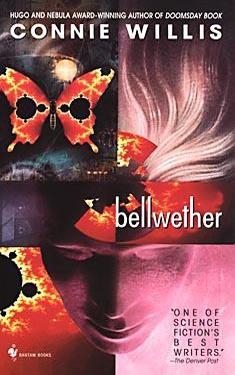 Bellwether by Connie Willis
Bellwether by Connie Willis
Published: Bantam Spectra, 1996
Awards Nominated: Nebula Award, 1997
The Book:
“What makes something become a fad? That’s the question Sandra Foster wants to answer through her research for HiTek Corporation. HiTek’s bureaucratic atmosphere isn’t making her task any easier. Sandra is constantly derailed by overcomplicated paperwork, meetings, HiTek’s obsession with acquiring a prestigious grant and her supremely incompetent fad-following office assistant, Flip.
Thanks to a mis-delivered package, Sandra gets to know her fellow HiTek researcher Bennet O’Reilly, who works with monkey group behavior and chaos theory. Sandra is initially interested in him due to his strange immunity to fads, but their acquaintanceship quickly moves towards a closer collaboration. As their research spirals out of control, Bennet and Sandra search for the link between chaos theory, romance, fads, and a flock of sheep…” ~Allie
I’ve read a lot of Willis’ work, though this is the first book I’ve read outside of her time travel novels (Doomsday Book, Blackout / All Clear, To Say Nothing of the Dog). Bellwether is definitely characteristic of Willis’ style, but it is also a light, silly romantic comedy. This is also the third novel I’ve reviewed for the Grand Master Reading Challenge, hosted by WWEnd.com, a fantastic website I recommend highly for any fans of speculative fiction.
My Thoughts:
Bellwether does feature scientists, but it doesn’t really seem like a science fiction story. I can’t help but wonder if it was simply labeled that way out of habit, since most of Willis’ work is science fiction. Bellwether is mostly a light, satirical romantic comedy about fads, scientific discoveries, and office politics. Willis’ familiar style is present here, as she draws humor out of obnoxious side characters, miscommunication, incompetence, and all the little frustrations that crop up in everyday life. Bellwether is more in the vein of To Say Nothing of the Dog than Doomsday Book or Blackout / All Clear. It is by far the shortest and fluffiest Connie Willis novel I’ve ever read, but it was a very pleasant, light read.
Throughout the story, Willis includes little facts about real fads and circumstances around unexpected scientific breakthroughs. I really enjoyed these inserts, though I think this attention to historical and recent-to-publication (1990s) fads dates the book. It happens to be just the time period to invoke nostalgia for me, but I’m not sure how well this would fly with people who aren’t in my generation. There are a lot of ‘current’ fads introduced in the novel as well. Most of these are believably ridiculous, but some of them seem unlikely to occur in our current times. I think that it is the nature of fads to become obsolete very quickly, and the fad-focused setting causes the book to be very much a product of its time.
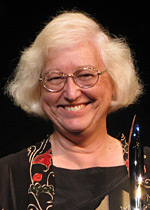 Aside from the fads, there was a lot of satire of office culture. Having dealt with bureaucracy extensively, I found this satire ridiculously stressful to read. To ‘help’ their employees’ productivity, HiTek had constant meetings and workshops, and a lot of time was spent describing their required paperwork, which was so ridiculously complicated that it actually obstructed employee progress. Included in this satire is also one of the major ‘obnoxious characters’, the office assistant Flip. Flip is a trendy young woman who doesn’t really do anything useful, and instead seems to damage productivity everywhere she goes. Sandra tries to make the best of things by befriending her, but this only makes her behavior worse. I think many people who’ve worked in an office environment have probably been stuck at some point with someone as lazy and incompetent as Flip.
Aside from the fads, there was a lot of satire of office culture. Having dealt with bureaucracy extensively, I found this satire ridiculously stressful to read. To ‘help’ their employees’ productivity, HiTek had constant meetings and workshops, and a lot of time was spent describing their required paperwork, which was so ridiculously complicated that it actually obstructed employee progress. Included in this satire is also one of the major ‘obnoxious characters’, the office assistant Flip. Flip is a trendy young woman who doesn’t really do anything useful, and instead seems to damage productivity everywhere she goes. Sandra tries to make the best of things by befriending her, but this only makes her behavior worse. I think many people who’ve worked in an office environment have probably been stuck at some point with someone as lazy and incompetent as Flip.
Most of the plot featured Dr. Sandra Foster as she went about her daily life, attempting all the while to find the origin of hair bobbing. This may sound boring, but I think that describing daily life in a light, humorous way is Willis’ forte. Sandra goes through children’s birthday parties, cafes, libraries, and HiTek, observing everything with an eye towards fads and absurdities. The romance in the story is pretty obvious and predictable, but adorable all the same. The conclusion was as chaotic and ridiculous as expected, and the whole story left me in a cheerful mood. Bellwether is certainly a light read, but it was a lot of fun.
My Rating: 3.5/5
Bellwether is a satire of fads and office culture and a romantic comedy, but it didn’t really seem like a science fiction story. The story is much lighter, shorter and more carefree than many of Willis’ other novels, but her style was still here in full force. There’s no time-traveling Oxford (as in Doomsday Book, To Say Nothing of the Dog, etc.), but her characters still come up against irritating minor characters, minor frustrations, and ridiculous bureaucracy. The focus on fads, and some of the attitudes of the main characters, left the story feeling firmly set in the 90s, and it will likely feel even more dated to readers who haven’t lived through that decade. The writing was light and humorous, the characters were likeable or likeably obnoxious, and the predictable eventual romance was very cute. It may lack the depth and gravity of some of her other works, but Bellwether is a funny, cheerful book that made for pleasant light reading.



















 Full Details
Full Details
